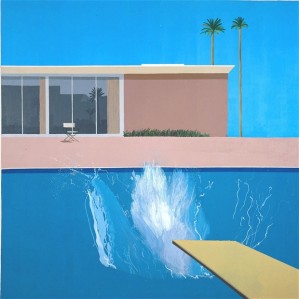
Unless one says goodbye to what one loves, and unless one travels to completely new territories, one can expect merely a long wearing away of oneself and an eventual extinction – Jean Dubuffet
In 1976, David Hockney, the British artist, set up a permanent home in Los Angeles, drawn by the sensuality and relaxed nature of Californian life. He discovered that pretty much everyone had a swimming pool and that these could be used year round because of the warm, sunny climate. Although “A Bigger Splash” is perhaps his most well-known, he painted a series of pictures depicting swimming pools, attempting to capture the elusive quality of the ever changing surface of the water. Unlike some of his other paintings from the period, “A Bigger Splash” contains no human figure, although the splash of course suggests the presence of a diver. Of “A Bigger Splash”, Hockney said, ‘When you photograph a splash, you’re freezing a moment and it becomes something else. I realise that a splash could never be seen this way in real life, it happens too quickly. And I was amused by this, so I painted it in a very, very slow way.’ You can obtain a facsimile of Hockney’s splash with a decent camera. A flash. A splash. A moment in time. We chase the splash all too often when we’re trying to change things. Especially in the workplace. We want to create an impact. The big splash of innovation and creativity. Hockney captured a splash but it’s the process and application of his skill and focus and deliberation that sets his work apart from the click of a camera shutter. It’s easy to get angry and frustrated at the pace of change in organisational life. I know I do. And I don’t even work in one. I’ve spent nearly three weeks getting in a lather about it. Angry and frustrated on behalf of other people. It’s not helping me be helpful. It’s time to let it go.
That said, change we must. We are living through what is known as the Holocene epoch. It’s been going on since about 10,000 BCE. It’s an epoch marked by mass extinctions caused by the proliferation of modern humans. Noted victims were megafauna such as the mammoth, wooly rhino, giant cave bear, sabre toothed tigers and the elephant-sized ground sloth. These extinctions continue today. The global loss of species is staggering. In its new Living Planet Index, the London Zoological Society suggests that populations may have halved in the last 40 years, reporting that populations of mammals, birds, reptiles, amphibians and fish have declined by an average of 52%. Despite the best efforts of those reaping the massive rewards, the financial crisis has failed to kill off the big beasts of the corporate landscape and it appears that for many of them it’s very much back to business as normal. Barely a day passes without some new scandal of corporate jiggery-pokery emerging. Thriving alongside these business behemoths are the coterie of advisors and consultants. Purportedly there to advise on efficiencies and best practice they’ve been revealed to be the vultures and hyena we always suspected they were. Evolutionary anachronism in plants, refers to those fruit, flower, leaf and stem attributes that evolved as an interaction with animals that are now extinct. As our command and control, hierarchical organisations die off, the only hope for the men in suits is to become that evolutionary anachronism. With a thick skin and a stone at heart. Like an avocado.
There is, however, a new breed emerging. People who want to help people. To work at a more human scale. At a more human pace. Applying skill, focus and deliberation. Concerned with happiness over ROI. Creating a space where people are people. Not assets. Not talent. Not pigeon-holed. Thoughtfully applying creativity to building new types of sustainable, socially useful businesses. And that is really something to treasure.
Postscript – I am indebted to the people who provided the three words around which I built this post.
They are:
Mark Catchlove who suggested “treasure”
Sarah McKenna who suggested “avocado”
Thomas Ragon who suggested “pool”
[…] Simon Heath delivers a tour-de-force write here on the nature of change, evolution and the emergence of a new breed. @SimonHeath1makes me think and isn't that the best compliment we can provide to an author? […]